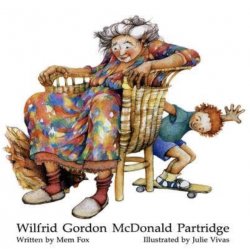Gareth B. Matthews

Review of Wilfred Gordon McDonald Partridge by Mem Fox (New York: Kane Miller, 1985). Originally published in Thinking: The Journal of Philosophy for Children 8(3): 1.
Wilfred Gordon McDonald Partridge was a very small boy with a very big name. He lived next to an old people’s home, where he liked to go and socialize with the eccentric old people he found there. Mrs. Jordan played the organ for him, Mr. Hosking told him scary stories, Mr. Tippett, who was himself crazy about cricket, played with him, he ran errands for Miss Mitchell and admired the giant voice of Mr. Drysdale. But his favorite person of all was Miss Nancy, to whom he told all his secrets. One day Wilfrid Gordon overheard his mother and father say that Miss Nancy, who was 96, had lost her memory.
“What’s a memory?” asked Wilfrid Gordon.
“It’s something you remember,” his father told him. Dissatisfied, Wilfrid Gordon began to ask the old people in the home what a memory is.
“Something warm;” said Mrs. Jordan.
“Something from long ago;” said Mr.Hosking.
“Something that makes you cry,” said Mr. Tippett.
“Something that makes you laugh;” said Miss Mitchell.
“Something as precious as gold;” said Mr. Drysdale.
Wilfrid Gordon went back home to look for memories. In a basket he collected: shells he had put in a shoebox, a puppet on strings, a medal his grandfather had given him, his football, and a nice warm egg, fresh from under the hen.
Wilfrid Gordon took his basket of precious objects to Miss Nancy, who was in deed very pleased. As Wilfrid Gordon took each precious thing out of the basket and gave it to Miss Nancy, she remembered something. The warm egg reminded her of eggs she had once found in a bird’s nest in her aunt’s garden. She put a shell to her ear and remembered going to the beach by tram long ago, in button-up shoes. She touched the medal and remembered sadly her big brother, who had never come back from the war. The puppet on strings re minded her of a puppet she had once shown to her sister. The football reminded her of the day she had first met Wilfrid Gordon. With these memories fresh in her mind, Miss Nancy had her memory back again.
Like Proust’s memories of childhood, our own memories are sometimes locked in the precious objects of the world, waiting to be unlocked by a taste, a glance or a touch. In a sensory deprived environment-a hospital, say, or a nursing home-memories may fade, and with them, memory.
Of course, organic deterioration, or physical or psychological trauma, may play the leading role in the loss of memory. I once phoned long-distance a friend I hadn’t seen in fifteen years. I wanted to announce that I was about to fly to the city where he was then residing, and I wanted to see him.
The voice on the other end of the phone was familiar enough. I gave my name and waited for an expression of recognition and pleasure. None came. There was only silence. Feeling increasingly uncomfortable, I began recalling some of the experiences we had enjoyed together. There was still no response. Yet the voice was friendly. I was invited to visit.
I went. The figure I encountered was what I expected-a little older than I remembered, but with the familiar face, voice and gestures. Yet at no time during the evening we spent together did I receive any recognition of our common experience together. The person I socialized uneasily with that evening was either unable or unwilling to dredge up the memories that, according to John Locke, are both necessary and sufficient to make him the person I had once known so well.
Locke’s views on personal identity (see his An Essay Concerning Human Under standing, Book II, Chapter 27), though they harbor many difficulties familiar to all serious students of the subject, retain a natural appeal. On Locke’s view, Wilfrid Gordon is not just using his collection of precious objects to help Miss Nancy to have certain experiences-some of them warm and comforting, others sad or funny. He is helping her to be able to make connection with the past in such a way as to be the person who waved goodbye to her big brother as he went off to war, and to be the person who first met the little boy with a big football and a very long name on the porch of the old people’s home some months before.
It is difficult to spend time with a favorite old person, as Wilfrid Gordon did, and not puzzle over personal identity. Just as one may have lost forever the person one cherishes, a precious object may bring her back again, perhaps with a force that removes all doubt she is still there.
